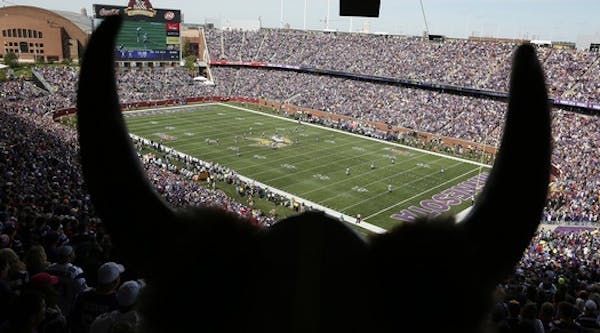It was my first Minnesota Vikings game and my first NFL game. I am not new to football, though. As an undergrad at Boston College, I went to many Eagles games, and I played junior varsity football. I knew what to expect on the field. I was excited, and, as I found my seat, I thought about bringing my family to a game in the new stadium.
What I didn't expect was for a man to push aside other people and point his finger in my face, demanding to know if I was a refugee. He needed to make sure I wasn't a refugee, he said. There was anger in his face and vehemence in his accusation.
I was stunned. He didn't know anything about me. We were complete strangers. But somewhere in his mind, all he saw was a terrorist, based on nothing more than the color of my skin. He was white, and I wasn't. He didn't see anything else.
He didn't know that I have lived in Minnesota for the past four years, that I was born and raised in New York and that the words "Never Forget" may mean more to me than to him. He didn't know that when I went home and my children jumped on top of me and asked "How was the game?" that I'd be holding back tears as I told them about racism instead of touchdowns. He didn't know that I am an attorney and the director of the Refugee and Immigrant Program at the Advocates for Human Rights.
It was also abundantly clear that he didn't know about refugees, dignity or freedom. He didn't know that if he were speaking to a refugee, he'd be speaking to someone who feared persecution due to their race, religion, nationality, political opinion or social group. He didn't know that many refugees are victims of some of the worst human-rights abuses occurring on the planet, ranging from being sold into sexual slavery to being killed in mass executions. He didn't know that being a refugee is a badge of resilience and honor, not danger.
In that moment, I was terrified. But what scared me the most was the silence surrounding me. As I looked around, I didn't know who was an ally or an enemy. In those hushed whispers, I felt like I was alone, unsafe and surrounded. It was the type of silence that emboldens a man to play inquisitor. I thought about our national climate, in which some presidential candidates spew demagoguery and lies while others play politics and offer soft rebukes. It is the same species of silence that emboldened white supremacists to shoot five unarmed protesters recently in Minneapolis.
The man eventually moved on. I found security staff, and with a guard and friend at my side, I confronted the man on the concessions level. I told him that what he said was racist and that what he did scared me. I told him that I was afraid to return to my seat and that I was afraid that people were going to hurt me. I told him that what he did makes me afraid for my children.
Somewhere during that second confrontation there was a change. Maybe some humanity crept inside him. Maybe he felt the presence of the security guard. While he said he was sorry, his apology was uttered in an adolescent way that demonstrated that he felt entitled to reconciliation as much as he felt entitled to hurl hatred. He wanted to move on and enjoy the game. I told him that I didn't want his apology. Rather, I wanted him ejected from the stadium because he made me feel unsafe.
The security staff talked with him privately. I don't know what was said. He was not removed. Apparently, the Vikings do not think that hate speech and racism are removable offenses. My gameday experience was ruined. I tried to focus on the players, but I continued to take glances at the man who sat just a few yards away. I couldn't help looking over my shoulder, wondering if he had inspired someone else. It was clear that I would not be bringing my family to a Vikings game.
I am deeply troubled by what happened to me. Hate speech is a warning for us all. It is like smoke. Imagine your office, church or stadium filling with smoke, while everyone acted like nothing was wrong. That smoke eventually becomes an unstoppable fire, the type of fire that has consumed people around the world to commit horrendous crimes, the type of fire that can bring down the entire building. As President Obama stated in his address from the Oval Office on Sunday evening: "[I]t is the responsibility of all Americans — of every faith — to reject discrimination." It is up to us all, from individual bystanders to institutions as big as the Vikings, to respond to and to stop the spread of racism and hate.
Deepinder Mayell is an attorney and director of the Advocates for Human Rights' Refugee and Immigrant Program.
Lab-grown beef is red meat for the conservative base


